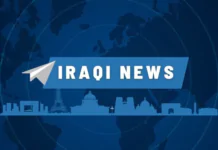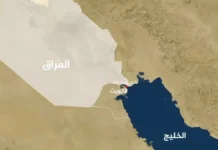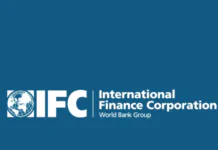An Economist Warns Of Financial Hardship And The Ax Of Rentierism: They Will Fall At The Head Of The Iraqi Economy
September 7, 2024 Baghdad / Iraq Observer Economic affairs researcher, Ziad Al-Hashemi, warned today, Saturday, of financial hardship and the ax of rentierism, while indicating that they will soon fall at the head of the Iraqi economy.
Al-Hashemi said in a post followed by Iraq Observer, “Global markets are surrounded by many recessionary indicators that lead to real pessimism, and oil prices are declining, and Iraq is one of the biggest potential victims of the decline in the price of a barrel of oil,” noting that “now is not the time to talk about diversifying sources of income, as it has been wasted.”
Successive Iraqi governments and the political system provided many opportunities and squandered hundreds of billions without taking a real step forward to get rid of the state of high dependence on oil.” He added,
“Urgent solutions are now required to save what can be saved, by developing a national emergency plan to deal with a financial situation characterized by (hardship and deficit).”
He pointed out that “this plan includes the following:
1- An urgent executive program to identify the fake employees (almost a million fake ones), cancel their salaries, and get rid of the situation of multiple salaries for each individual! The continued depletion of state finances with massive fraudulent salaries will soon bring down the government with a knockout blow as oil prices continue to deteriorate.
2- Compressing expenditures with all possible tools and means, and raising the level of control and auditing of expenditures with the aim of achieving a higher level of financial discipline.
3- Maximizing the government’s revenues from taxes and customs (fully activating the customs system) and reducing the level of laxity in the collection system.
4- Monitoring commercial markets and prices, encouraging merchants to reduce profit margins, and holding accountable those who practice commercial greed and monopoly.
5 – A massive campaign to monitor corruption funds, recover them, and annex them to public funds.
6- Re-evaluating projects and referrals to tenders and opening the door to negotiation to postpone or cancel non-essential projects or achieve price differences for the benefit of state finances or other spending sections!
7 – Establishing borrowing and debt instruments (as a last resort) that the government resorts to, to avoid increasing the amount of public debt, which is already high.” He stressed,
“These are some of the proposed quick solutions and treatments that certainly do not replace long-term solutions that focus on economic diversification.
Without implementing these and other solutions, let this government and
Adviser To The Prime Minister: Central Bank Decisions Contribute To Reducing Inflation Rates In The Country
Economical 09/08/2024 Baghdad: the mainstay of the emirate The financial advisor to the Prime Minister, Mazhar Muhammad Saleh, explained that the decisions of the Central Bank contribute to reducing inflation rates in the country, and pointed out that economic growth contributes to strengthening the value of the local currency.
Saleh said in a statement to “Al-Sabah”:
“The policies of the Central Bank play a major role in stabilizing the currency, which is something that achieves harmony between the internal value of the currency and its external value,” explaining that
“decisions to raise or reduce interest as part of monetary policy work will undoubtedly be reflected in… Reducing inflation rates and maintaining the stability of the currency value.”
He added that the prosperous and sustainable economic growth in gross domestic product contributes to enhancing the value of the currency and its stability, indicating that the
real factors affecting the strength of the national currency include high productivity and high employment of the labor force, in addition to real investment and innovation, especially technological development . Saleh pointed out that
technology and innovation can lead to improved productivity and economic growth, which enhances the value of the currency, and these are all factors generated by the real sector in the economy or the national development policy.
He pointed out the importance of political stability and the strength of the administrative system and its governance, which are important behavioral factors in enhancing confidence in the national currency. https://alsabaah.iq/102304-.html
Sudanese Issues 16 Directives To Develop Electronic Payment Systems And Services
September 7, 2024 Baghdad / Iraq Observer Today, Saturday, Prime Minister Muhammad Shiaa Al-Sudani directed a package of measures and directives to be taken to develop electronic payment systems and services and to follow up on their implementation by specialized committees.
A government source told Iraq Observer,
“Within the framework of Prime Minister Muhammad Shiaa Al-Sudani’s continuous follow-up on the development of electronic payment systems and services, and in light of his review of the supervisory field reports related to the implementation of these services in various Iraqi ministries and institutions, he directed that a package of relevant measures be taken with follow-up.” Implemented by specialized committees.”
He added, “The directives were as follows:
1. Directing the Ministry of Planning, in cooperation with the Central Bank of Iraq and the World Bank, to create a national budget allocated to support and develop digital payment systems nationwide.
2. Directing all ministries, including the Central Bank of Iraq, to prepare electronic cash flow statements periodically to ensure financial transparency, determine liquidity and manage risks, which contributes to improving financial planning.
3. Directing ministries and government institutions to establish strategic partnerships with banking and non-banking financial institutions as well as technological institutions and adopt effective action steps for cooperation and exchange of proposals and experiences.
4. Obligating financial and banking institutions to develop their technical and digital systems in accordance with the latest international standards, including strengthening anti-money laundering and anti-fraud systems; This is to ensure operating efficiency, improve the quality of banking services, and achieve full compliance with regulatory controls.
5. Obligating financial and banking institutions to develop cyber protection systems and adopt the cyber resilience document, while strictly adhering to the controls issued by the Central Bank regarding electronic governance, to ensure comprehensive protection of banking systems against cyber threats and to ensure business continuity in light of crises.
6. Directing ministries and government institutions to develop capable government work teams to follow up on electronic payment operations on a daily basis through training and qualification, and through specialized system portals provided by payment service companies.
7. Directing the Ministry of Communications to cooperate with ministries and government institutions to expedite the adoption of the Electronic Signature and Electronic Transactions Law No. 78 of 2012 to comply with the requirements of electronic payment and collection settlements in the Ministry of Finance in cooperation with the Central Bank of Iraq.
8. Instructing the Ministry of Finance to submit a study on the mechanisms for creating intermediary accounts, approved by government institutions as a mechanism for dealing with restricted government accounts to solve the problem of deductions to citizens in the event of failure of financial operations.
9. The Central Bank issues directives to private and government banks to deal transparently and not to discriminate between electronic payment companies.
10. The Central Bank of Iraq prepares what is necessary to cancel prepaid ceilings for cards used locally to ensure wider and more flexible use.
11. Directing ministries and government institutions to establish specialized units within state departments to facilitate financial reconciliation and settlements and resolve disputes resulting from electronic payments, in coordination with banks.
12. Directing the Integrity Commission to intensify oversight of collection points in government departments to ensure transparency and integrity.
13. Directing the Financial Supervision Bureau to develop and legislate administrative and financial updates that are compatible with electronic payment systems and to follow them on an ongoing basis.
14. Emphasis on government institutions and electronic payment service provider companies to implement the paragraphs contained in the electronic collection and collection agreements, and in accordance with the responsibilities of each party contained in those agreements.
15. Directing government banks to complete the activation of the comprehensive banking system to improve financial and administrative performance.
16. Obligating all ministries and government institutions to adopt advanced electronic administrative and accounting systems to enhance efficiency and transparency. https://observeriraq.net/السوداني-يصدر-16-توجيهاً-لتطوير-أنظمة-وخ/
For This Reason… Economic Calls To Review Tax Laws And Develop The Collection System
Money and business Economy News – Baghdad With the increase in the size of state expenditures in the general budget, there has been talk for years about the issue of
maximizing non-oil revenues,
reforming the tax system in Iraq, and
raising the value of taxes on the wealthy,
which is something that actually needs to address the current laws regarding tax, controlling import operations, and preventing the smuggling of goods through border crossings.
In this regard, economic and financial expert Safwan Qusay revealed the formation of a committee by the Prime Minister to review tax laws, especially the income tax law issued in 1982, indicating that
the law needs to be reviewed to amend some allowances in proportion to current income rates and develop the tax collection system. To reduce tax evasion. He pointed out that
“the proposed increase in tax aims to stop manipulation of invoices related to import operations and reduce tax evasion.”
Qusay also confirmed that “the committee is considering introducing amendments to property and real estate taxes, especially with regard to the transfer of property between individuals.” https://economy-news.net/content.php?id=47221
An Advisor To The Prime Minister Warns Of The “Risks Of Low Oil” On Fiscal Policy And Spending
Time: 09/04/2024 17:39:37 Read: 2,977 times {Economic: Al-Furat News} The financial advisor to the Prime Minister, Mazhar Muhammad Saleh, warned today, Wednesday, of the “risks of a decline in oil revenues” with the decline in crude prices in global markets. Saleh told Al-Furat News Agency,
“First, there must be a systematic investigation into the fundamental factors causing the decline in crude oil prices in global markets and their rapid decline in the past few weeks, as
China is one of the world’s largest economies that import crude oil among nations, as its imports increase.” Of crude oil, about 10 million barrels of oil per day, and Iraq alone contributes about 10% to China’s need for oil, or approximately 30% of Iraq’s oil exports are directed towards the Chinese market. He stated,
“China‘s demand for oil is linked to the annual growth rates of its economy, and it is a truly direct relationship.
The greater the growth in annual gross domestic product, the greater the demand for crude oil.” Saleh pointed out,
“There is a parallel between increasing GDP and increasing oil consumption by a rate ranging from 0.5% to every 1% increase in GDP, although this parallel may change based on energy efficiency and market developments.”. He pointed out that
“with this slowdown in Chinese economic growth (which is the second largest economy in the world), it has begun to increase during the second half of this year, as the annual growth rate is expected to decline to about 4.5%, after it was 5. 4% at the beginning of the year, and
thus the decline in growth in the Chinese economy has become an urgent issue that greatly affects the global economy and the stability of demand in the energy market.” He noted,
“Chinese economic data are noticeable indicators of weakness, especially in the industrial and service sectors, as the Purchasing Managers’ Index in China in August 2024, which is a main measure of economic activity, recorded a decline to its lowest level since six previous years.” He continued,
“Such a decline reflects a decline in both domestic and external demand for goods and services, as new export orders in China fell in July for the first time in eight months, indicating a decline in global demand for Chinese products.” The government advisor explained,
“The prices of new homes in China also rose, but at a very weak pace, which adds more pressure to the Chinese economy itself.” He pointed out that
“international expectations indicate that growth in the gross domestic product in these countries will continue to decline to about 3.5% until the year 2028, which reflects the structural challenges facing the Chinese economy in the long term.” Saleh said,
“Based on the above, oil prices witnessed a noticeable decline today, September 4, 2034, as Brent crude fell below $74 per barrel.
This sharp decline is attributed, as we mentioned earlier, to ongoing concerns about the slowdown in economic growth in China, which… “It negatively affected the demand for oil, which increased global markets’ concern about the continued weakness of global demand for crude oil.” He concluded by saying,
“The matter is related to Iraq, where the federal general budget issued by Law No. 13 of 2023 (the tripartite budget) is still hedging an annual hypothetical deficit of approximately 64 trillion dinars, and the price of a barrel of oil for the purposes of evaluating oil revenues in the budget during the past year is about $70 per barrel (as an annual average).
Therefore, fiscal policy may face the risks of a decline in oil revenues, by activating the necessary precautionary financial measures to sustain expenditures and in accordance with the priorities and principles set forth by the Federal Budget Law itself, whether in financing the deficit or in arranging public spending priorities.
https://alforatnews.iq/news/مستشار-لرئيس-الوزراء-يحذر-من-مخاطر-انخفاض-النفط-على-السياسة-المالية-والانفاق
For current and reliable Iraqi news please visit: https://www.bondladyscorner.com/






